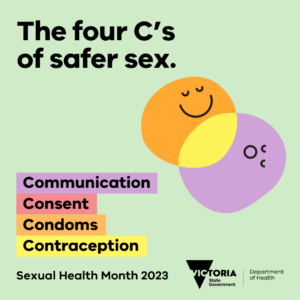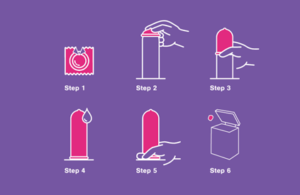What do you think about when you hear the term ‘safe sex’? People often think the term safe sex is only about protecting themselves and partners from unplanned pregnancies and sexually transmissible infections (STIs). But safe sex means much more than that – it’s not just about whether you’re being sexually safe, it’s about whether you feel safe too.
When we talk about safe sex, we often describe it using four words that start with the letter ‘C’. These are consent, condoms, contraception and communication.

1. Consent
Without consent, sex can’t happen. It’s as simple as that. But what exactly is consent?
Consent is when one person gives permission to another person to do something (for example, to kiss, hold hands or have sex). A person must say or do something to communicate consent. Consent can be communicated by words or gestures. Both people need to know what is going to happen and know that they have the option to say ‘no’ or to change their mind later on.
Every time you have sex, or take part in any type of sexual activity (kissing, touching, hooking up, holding hands) with another person, you need to get their consent.
We wrote a blog about consent to help you understand what it is, where to get more information and what consent means here in NSW. You can also head to the Hub’s Consent & Relationships page to find out more.
2. Condoms
Condoms are a barrier that prevents skin to skin contact and the transfer of body fluids. Using condoms is the best way to keep you safe and protect against STIs. In fact, they’re 98% effective at protecting against STIs like chlamydia and gonorrhoea when used correctly.
Condoms are the only form of contraception that protects against both STIs and unplanned pregnancies. Condoms should be used every time you have sex. There are two types of condoms:
- male condoms (external condoms) which are worn on the outside of the penis
- female condoms (internal condoms) which are worn inside the vagina
Read our blog on Condom Do’s and Don’ts to learn more about how to use a condom, where to get condoms from and what to do if a condom breaks.

Do I still need an STI test if we’re using condoms or taking PrEP?
The quick answer is yes, you do. Getting regularly tested for STIs is a normal part of a healthy sex life and is recommended every 6-12 months as standard practice, or if you change partners, have unprotected sex, or experience any symptoms. If you are a guy who has sex with other guys, it is recommended you get tested four times a year.
The reason you still need an STI test even if you’re using condoms or taking PrEP is that condoms (even though they are super effective) are still not 100% reliable. If you’re taking PrEP, PrEP doesn’t protect you from other STIs (only HIV!).
PrEP stands for pre-exposure prophylaxis. PrEP is a medication taken to prevent HIV for people at risk of HIV. When taken correctly, PrEP is highly effective at preventing HIV. PrEP reduces a person’s risk of getting HIV from sex by about 99%.
People who might be eligible for PrEP include men who have sex with men and do not always use condoms, people whose partners have HIV as well as a range of other people. If you would like to find out if PrEP is suitable for you, you can talk to your local, a local sexual health clinic or the NSW Sexual Health Infolink on 1800 451 624.
Your doctor or a sexual health clinic can give you a prescription for PrEP. Check with your OSHC provider if PrEP costs can be claimed. You can also visit the PrEPaccessNOW website for more information on accessing free PrEP in NSW.
3. Contraception
Condoms are the only way to prevent both STIs and unplanned pregnancy, but some people may use an additional contraceptive method as well. Not everyone needs to think about contraception as not all types of sex can result in pregnancy.
There are many methods of contraception that work in different ways. It’s important to find the one that suits you best.
The contraception options available in Australia might be different to other countries. In our blog My body, My Choice: Contraception Options, we explore some contraception options that you can get in New South Wales.
- The Contraceptive Pill is a small tablet taken every day. It’s a very common form of contraception that stops the ovaries from releasing an egg, therefore protecting against unplanned pregnancy as there is no egg for the sperm to fertilise
- The Hormonal Intrauterine Device (IUD) is a small T-shaped device inserted by a doctor into the uterus (womb). Hormonal IUDs and can be left in place for up to 5 years. The copper IUD works without any hormone and can stay in up to 10 years
- The contraceptive implant is a small, flexible rod implanted under the skin (usually on the arm). It stays there for up to three years and releases a hormone called etonogestrel which helps prevent pregnancy
- The contraceptive injection contains progestogen and prevents pregnancy for 12 weeks by stopping ovulation
Read an international student experience of finding the best contraceptive method for them in our blog what contraception choices are available for me?

4. Communication
Communication is important, as, without it, conversations around consent, condoms and contraceptives can’t happen.
Whether you’re having a casual sex such as a one-night stand, friend with benefits, or quick fling, or whether you’re in a long-term relationship, communication is important.
Communication can happen before, during and after a sexual experience:
- Before: Before sex is when all the important conversations around condoms, contraception and consent should be happening (although remember conversations about consent need to happen both before and during). It’s also the perfect time to set boundaries and expectations
- During: Check in with your partner, are they enjoying themselves? Do they like what you’re doing? If you want to try something new, ask them and make sure they’re comfortable. Communication during sex isn’t all verbal, it’s non-verbal too. Focus on eye contact, sighs and moans, and physical cues which show if the other person is enjoying themselves
- After: Asking your partner if they’re okay after sex shows care and concern and also helps you know what’s right for next time. Ever heard of pillow talk? Telling someone how great they were in bed and how amazing it was will build confidence and help make you even more comfortable with each other
Follow these four C’s of safe sex – Consent, Condoms, Contraception, and Communication for a safe and healthy sex life.




